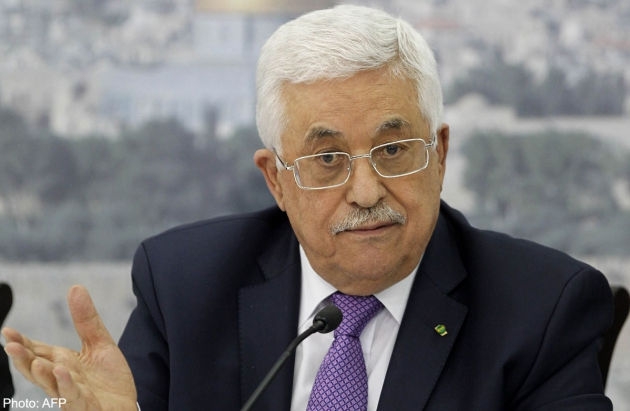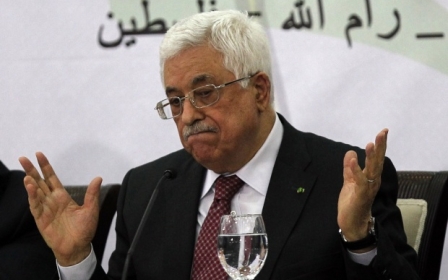Waiting for Godot: A leader for the Palestinian national movement

In a surprise move, Palestinian President Mahmoud Abbas and those who support him have resigned from the PLO's executive committee. Abbas intends to reconvene the Palestine National Council (PNC) - a body which has not met for over 40 years - in order to elect a new executive committee.
So, while rumours abound about Abbas’ thinly veiled threats to retire from politics, it is more likely that these moves represent a bid by the Palestinian president to tighten his grip over the executive committee. But why would he do this in the absence of any real challenge from inside the PLO? Reportedly, Abbas could be seeking to clear out his remaining enemies on the executive committee before placing the PLO in direct confrontation with Hamas.
The astonishing thing about all this is that the president himself has almost entirely alienated himself from the national Palestinian debate. He seems less and less interested in advancing the national cause, whether by negotiation or popular struggle. His sole preoccupation is to secure his presidential position with bureaucratic manoeuvres inside the PLO’s leading institutions.
The crisis within the Palestinian national leadership is, in fact, the mirror image of the crisis within Fatah itself. This is the force that led the Palestinian national struggle and the PLO since the end of the 1960s. There is no clearer evidence of Fatah’s swift decline and its loss of direction than the absence of effective leadership in the PLO and the Palestinian Authority (PA). Fatah’s ineptitude has created a vacuum which is yet to be filled by an alternative political force - not even by Hamas, which occupies a far more prominent position in the national resistance movement than that of Fatah.
The rise and fall of Fatah represents one of the most significant episodes in the history of the Palestinian struggle in the last century. Opinions may vary about the origins of Fatah, but there is no doubt that the movement, which was founded by a handful of people in Palestinian intelligentsia, spent its first years on the margins of the Palestinian and Arab political arena.
In the late 1950s and all the way to the 1967 defeat, the Arab nationalist discourse, with its Nasserist narrative, dominated the Arab world, including the Palestinian diaspora. Yet, Fatah’s founders did not hesitate to contradict the Nasserist vision and to come up with a counter narrative.
When Arab nationalists, led by the Nasserists, claimed that Arab unity was a prerequisite for the liberation of Palestine, Fatah’s founders insisted that the struggle for Palestine represented the shortest path toward Arab renaissance and unity. When the nationalists attempted to dissolve Palestinian identity in an imagined Arab nationalist identity, Fatah's founders called for the reconstruction of the Palestinian national identity. Faced with ideological conflicts that ripped apart the Palestinian intelligentsia, Fatah’s founders said that the Palestinians were living in a period of national liberation whose only agenda should be the struggle for the liberation of Palestine.
Fatah backed its words with action, and went on to start a modest armed campaign in 1965. However, it was the June 1967 defeat that provided Fatah with the opportunity to prove the credibility of its path. In the end, and despite some exaggeration, the Palestinian armed resistance did play a major role in alleviating the heavy burden of the 1967 defeat in the Arab world. In addition to that, the Fatah-led national struggle contributed to the reconstruction of the Palestinian national identity that suffered from social and political fragmentation in the aftermath of the 1948 Nakba (catastrophe).
Within a few months of the 1967 defeat, Fatah, which had been outlawed and pursued by Arab security agencies, proved to be of vital importance to the official Arab regimes from Egypt and Syria to Saudi Arabia and Algeria. Thanks to this overt official support from the Arab states, and the backing of the majority of Palestinians, Fatah took over the PLO and its various institutions. It even went ahead with effecting fundamental amendments to the PLO National Charter. Somehow, whether for its political vision or its organising effectiveness, Fatah provided a framework for the Palestinian national consensus.
However, this consensus was soon to be shattered, beginning with the PLO's adoption of the 10-point programme in the mid-1970s. This is not the place to elaborate on the Arab and international contexts that forced Fatah and the PLO to embrace the idea of a Palestinian national authority, which would then develop into the project of a Palestinian state, over any liberated Palestinian territory. From there, the Palestinian national leadership went on a long journey that took them from the Lebanese civil war, the 1982 Israeli invasion that led to the expulsion of the PLO from Lebanon, the aftermath of the First Gulf War, the launch of the secret Oslo talks, and finally to the signing of the Oslo accords in 1993.
It is sometimes said, I think correctly, that the Oslo agreement was the natural outcome of the national authority project of the mid-1970s. But more importantly, the Oslo agreement and the establishment of the PA represented a major shift, a distant one indeed, in the history of the Palestinian national movement. Whether it was then realised by the PLO leaders or not, the PA has transformed a large segment of the national movement cadres into a security bureaucracy that put them in alliance with the Israeli occupation, sowing the seeds of a Palestinian civil war in the West Bank and the Gaza Strip, a war that continues to rage today.
With the collapse of a national consensus, and with the decision by Fatah – together with most of its allies within the PLO - to change course, Islamic forces became the vanguard of the Palestinian national liberation movement.
The first Palestinian uprising marked the beginning of the rise of the Palestinian Islamists. However, the balance of power in the Palestinian national arena did not tilt in favour of the Islamists until the second Palestinian uprising and its aftermath.
Despite the policy of repression and persecution adopted by the security agencies of the PA throughout the 1990s, the Islamists managed to reinforce their positions within the Palestinian society. Soon, Hamas emerged as the preeminent force of Palestinian resistance, whether inside the West Bank and the Gaza Strip or in the diaspora.
However, neither the Islamists nor any other political force has managed to provide the consensual frame of reference for the Palestinian struggle, not just in terms of goals and programmes but also in terms of the capacity to include and attract the sympathy and support of the majority of the Palestinians. One of the reasons for this situation, of course, has been the Islamic ideological background of Hamas. The other reason may be attributed to the fact that no single political force ever managed to lead the Palestinian national movement without Arab official consent and support.
The problem is that Palestinian division, and the delay in settling the question of leadership, will simply make it possible for fiascos, such as the convening the Palestine National Council for no other reason than to satisfy Abbas's wish to tighten his grip around the leadership of the PLO, to happen again and again, while the Palestinian cause goes to hell in a handcart.
- Basheer Nafi is a senior research fellow at Al Jazeera Centre for Studies.
The views expressed in this article belong to the author and do not necessarily reflect the editorial policy of Middle East Eye.
Photo: File picture shows Palestinian President Mahmoud Abbas (AFP)
Stay informed with MEE's newsletters
Sign up to get the latest alerts, insights and analysis, starting with Turkey Unpacked
Middle East Eye delivers independent and unrivalled coverage and analysis of the Middle East, North Africa and beyond. To learn more about republishing this content and the associated fees, please fill out this form. More about MEE can be found here.





